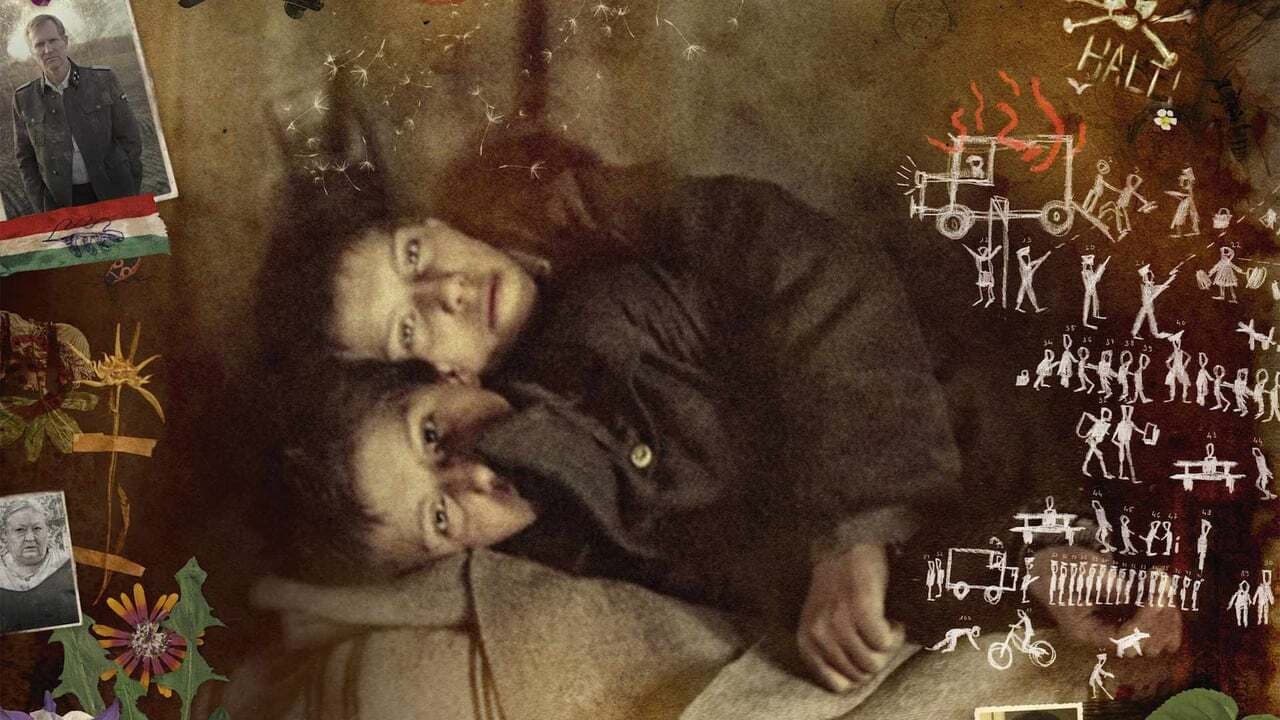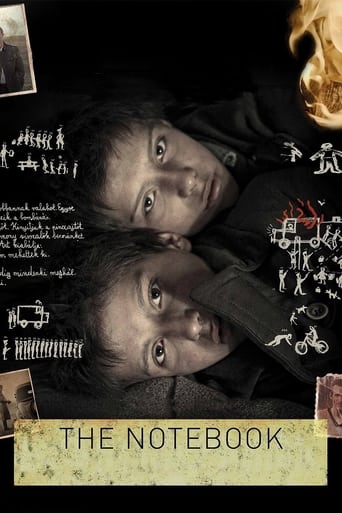Matcollis
This Movie Can Only Be Described With One Word.
Matialth
Good concept, poorly executed.
TrueHello
Fun premise, good actors, bad writing. This film seemed to have potential at the beginning but it quickly devolves into a trite action film. Ultimately it's very boring.
Griff Lees
Very good movie overall, highly recommended. Most of the negative reviews don't have any merit and are all pollitically based. Give this movie a chance at least, and it might give you a different perspective.
rmanory
Because the movie is about children experiences in WW2, I compare it to French movies with a similar plot and I can tell without doubt that this is perhaps the most terrifying of all. I think that the rough unexpected ending is not justified by the events preceding it. The boys do train themselves to withstand hardship--this is a very interesting point in the movie--but there is no justification to the way they treat their father. They cannot blame him for their hardship, except perhaps the fact that he returns from the war as a broken person, hardly compared to the attentive and loving father he was before he was recruited. I think the movie is outstanding in many aspects. There is no good person and bad person in their life during the war, but that's no reason for their last action. Their separation is also hard to understand. All in all however, it is a masterpiece and deserves to be widely seen.
SnoopyStyle
It's 1944. Twin boys live comfortable city lives. Their parents are worried about the impending Nazi defeat and upheaval. Their mother brings them to live with their bitter grandmother. They don't even know her who has been living alone in the Hungarian rural home estranged from her daughter. She's angry and beats on the boys. Local girl Harelip steals from them but she turns the table on the boys and they're the ones getting beaten. Nazis have a camp nearby. After constant beatings, the boys decide to toughen up and learn from the evil surrounding them.It's a disturbing violent world being portrayed. The twins are not necessarily good actors. They don't get much sympathy. The grandmother is fascinating in her ugliness. It's a cold-hearted fable without anybody to root for.
Alex Deleon
A NAGY FŰZET = The Notebook, Hungarian, 2013. Viewed at New Hungarian film week, Budapest November, 2014 Hungarian director János SZASZ (56) does not make many films, but when he does, it's always one he has thinking about for years, has been working on for three or four years, and is worked out to the minutest last detail. In between films he is a very busy theater director which is one reason why he is so adept at handling actors. His most recent film, "The Big Notebook", came out in 2013 and was one of the prestige Films of the year, shown at numerous festivals. I was only able to catch up with it at the New Budapest Film. Week and was not disappointed. Immediate reaction:The Third film of the day, the Nightcap that ended around Ten thirty, was Janos Szasz' arty WW II period Epic, "The Notebook" (A nagy füzet), the only really big Hungarian film of 2013, that I have been hoping to catch up with all year. Classically filmed as are all of János's films, this is a harrowing tale of two teenage twin boys who are left by their mother with an extremely stout, blunt, and tough-as-nails grandmother out in the country so they can survive the war. Their father who is called off to war at the very beginning leaves them with a Large Notebook -- whence the title -- instructing them to record all of their experiences while he is gone. This they do dutifully even when they are evacuated to granma's country house. However, grandma has not seen her daughter, their mother, for twenty years, is very resentful that she left and made no effort to contact her ever since. Only grudgingly does she allow her estranged daughter to dump these kids, her biological grandchildren, on her. The rest of the story -- the bulk of the film, deals with how these resourceful kids cope with a very bad situation. very bad --- part of it under German military occupation, and how grandma eventually accepts them and they her -- but only after years of extremely brutal mutual antagonism and other harrowing experienceEventually heavy set grandma dies of a stroke, or rather is assisted in her death by the boys who's earlier hate has finally turned into respect for this incredibly feisty old woman. Left me drained -- the kind of drain You feel after taking an emotional roller coaster ride through a fully satisfying picture. more details later, but thus is one of the new recent Hungarian biggies. Hefty 69 year old actress Piroska Molnár, who is memorable from her very first scene in the picture playing the estranged acid-tongued country grandmother, is currently one of the busiest "Leading ladies" in magyar pictures. She was equally memorable in the highly controversial Hungarian Film Szemle winner TAXIDERMIA in 2006, and Will also be seen here later this week in the lead role of the surrealistic chiller FREE FALL.
jkbonner1
The Notebook begins as World War II is winding down. As an ally of Nazi Germany and part of the Axis Powers Hungary is on the losing end. The movie focuses on two young twin boys (András and László Gyémánt), whose names we never learn. They are 12 when the movie begins in the summer of 1944 and 13 when the movie ends in the summer of 1945.To ensure their safety their parents (Gyöngyvér Bognár and Ulrich Matthes) place them in the care of the woman's mother, who lives in the countryside running a small farm. The problem is the grandmother (Piroska Molnár) has not seen her daughter in 20 years and clearly has a very low opinion of her. At the end of the movie she is surprised her daughter (after dying in a shell explosion) even had a husband. She is a mean old woman who's rumored to have poisoned her husband and the movie supports this conjecture. The villagers call her "the Witch." At the beginning of the movie the boys hate her because she keeps calling them bastards and is very mean to them. It's clear her grudge against her daughter is carried over to her grandsons to whom she shows no love nor warmth.The boys transform from normal children into two human beings who have hardened themselves both physically and psychologically to deal with the rapidly deteriorating situation in Hungary. They nonchalantly watch both their mother and baby sister get blown to bits (largely their fault) and they cunningly watch their father die crossing a minefield (entirely their fault). No remorse is shown. At the end of the movie they go their separate ways, from being inseparable twins to purposely separating themselves.To say the boys morph into monsters is not quite accurate. By the end they bear a grudging respect for their grandmother and assist her in dying after she's had a second stroke. They avenge an old Jewish man who's shown kindness to them by blowing the face off a pretty maid who turned him in to the authorities. So it's difficult to say that they've gone all the way from innocent boys to out-and-out psychopaths.The movie makes it clear the boys' transformation stems from the barbarous and irrational ordeal they are forced to endure from other people and from the War itself. They have had to survive the fall of Hungary. The German Army has pulled out as represented by the Waffen SS German Officer who departs abruptly and who's shown a homosexual interest in them. The Hungarian Army has fallen into tatters as represented by the Hungarian soldier the boys stumble upon frozen and starved to death. And the Soviet Army is rolling into Hungary raping any girl or woman they can get their hands on, like Hairlip (Orsolya Tóth). About the Soviets there's a caption that says: Welcome the liberators. They've come to take all you own. When a priest is surprised that the twins know their Ten Commandments, one of the boys comments: The Fifth Commandment says Thou Shalt Not Kill. But everyone kills.The Notebook could have used a brief introductory prologue to familiarize the viewer in more depth with the political context. Example: By 1944 the Second World War was rapidly being lost by the Axis Powers and Hungary, as an ally of the Axis Powers represented chiefly by Nazi Germany, was on the losing side. Several times in 1944 the Hungarian dictator, Admiral Horthy, sought to negotiate a separate peace with the Allies to pull Hungary out of the war but was unsuccessful. Under the direct orders of Adolf Hitler, in the autumn of 1944 the German Army (Wehrmacht) and the Waffen SS took over full control of the conduct of the war in Hungary but by the winter of 1945 Budapest, the capital of Hungary, surrendered to the rapidly advancing Soviet forces and the government of Hungary collapsed in total defeat.The Notebook is also a truly gripping and powerful movie, but definitely not for those who prefer to avoid the realities of life and who like nice, cheery, feel-good stories. Also not for those who like blow-'em-ups/shoot-'em-ups. Many of the scenes are very brutal and very intense. This movie will make you ponder in depth the inhumanity and abject cruelty some humans do to other humans. And it's still going on out there in spades in many parts of the world. The twin boys in The Notebook were not adults. The horrors of war twisted their minds forever. I hope this movie will make us think more deeply about the effect war can have on people―physically, psychologically, and emotionally―and how war can be stopped.The acting was well done and convincing and the cinematography contributed to the feel of Hungary at that time. This movie deserves to be watched.I'll end my review by saying what I said as a wrap-up in 12 Years A Slave. It's not for everyone.9/10PS: I saw this movie at the Hungarian Film Festival held at the Laemmle NoHo 7 on Lankershim Blvd in North Hollywood, California USA.

